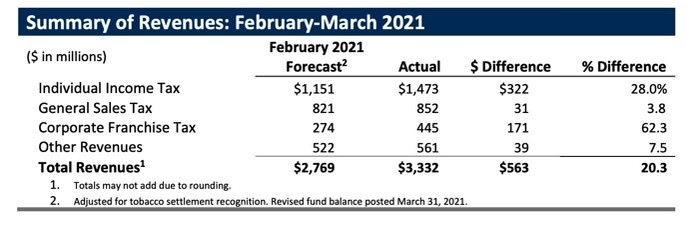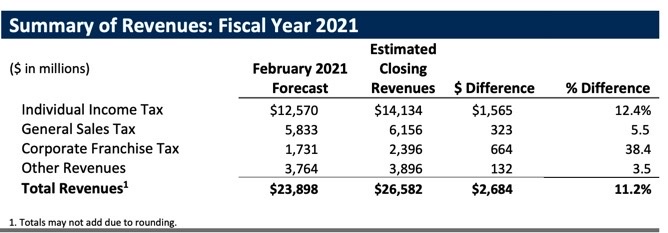Fiscal year ends with a $2.7 billion surplus
In May 2020, when the Minnesota Management and Budget (MMB) released their Interim budget forecast, they predicted a $2.426 billion deficit for the fiscal year ending July 2021 and a generally negative financial outlook for the 2022-2023 biennium.
However, by November, things had changed and the November budget forecast had a more positive outlook. In place of a $2.4 billion deficit, Minnesota was poised for a $636 million surplus for the fiscal year ending July 2021, and a smaller than expected $1.273 billion deficit for the 2022-2023 biennium.
But that was soon followed by the February forecast, which estimated a $1.573 billion surplus for the 2022-2023 biennium in place of a $1.273 billion deficit. And even two months after the February forecast, revenues were already 20 percent higher than what was forecasted.

This makes the most recent update from the even more unsurprising. According to the recent update, Minnesota has ended the fiscal year with a 2.7 billion dollar surplus. Compared to the initial 2020 May Interim budget, Minnesota collected at least $5 billion more than anticipated in 2021.
And compared to February’s forecast, tax revenues are 11.2 percent more than forecasted. And total tax collections in the months of April, May, and June –– final quarter of 2021 –– are 28.7 percent more than forecasted.

Minnesota is not the only state facing a budget surplus. Numerous states like Indiana, Ohio, Wisconsin, California among others have reported significant revenue surpluses. Tax collections show that states haven’t suffered as big a blow as they forecasted at the start of the pandemic. In fact, as of February this year, more than half of all states –– about 29 –– had reported collecting as much or even more revenues in the previous 12 months than they had in the 12 months prior to the coronavirus pandemic.
Currently, about 9 states have already cut their taxes, some in direct response to their budget surpluses, for example, Wisconsin and Ohio. Since Minnesota legislators already agreed on a budget for the next biennium tax cuts are out of consideration for current spending plans.
The fact still remains, however, that Minnesota taxes its residents too heavily, and this huge surplus should make the case for tax relief, especially after considering all the reforms being undertaken in other states.